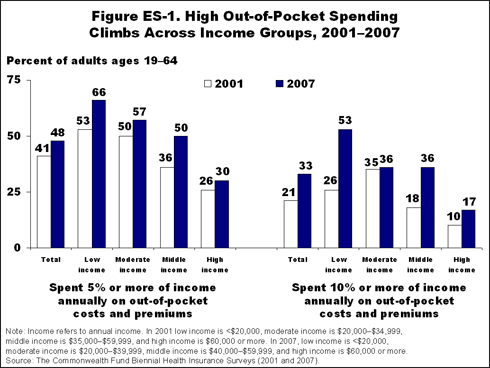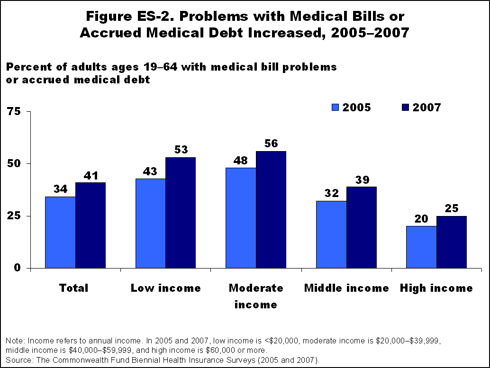Executive Summary
A perfect storm of negative economic trends is battering working families across the United States. The federal minimum wage is now three dollars an hour lower, in real terms, than it was 40 years ago; gas and food prices are soaring; home values are declining; growth in health care costs is far outstripping income growth; and people are increasingly going without the protection of health coverage—nearly 9 million have lost their health insurance since 2000. Families are facing financial crises and are forced to make hard choices among life's necessities, often sacrificing health care and health insurance along the way.
Using data from four years of the Commonwealth Fund Biennial Health Insurance Survey—2001, 2003, 2005, and 2007—this report examines the status of health insurance for U.S. adults under age 65 and the implications for family finances and access to health care. Insurance coverage deteriorated over the past six years, with declines in coverage most severe for moderate-income families. The share of insured adults who spend more than 5 percent or 10 percent of income on health care and insurance rose across all income groups between 2001 and 2007. As a result, the number of underinsured adults (i.e., those with health coverage that does not adequately protect them from high medical expenses) climbed to 25 million people in 2007, up from 16 million in 2003.
More adults are struggling to pay their medical bills and are accumulating medical debt over time. Forty-one percent of working-age adults, or 72 million people, reported a problem paying their medical bills or had accrued medical debt, up from 34 percent, or 58 million, in 2005. An additional 7 million adults 65 and older also reported bill or debt problems. (See the companion issue brief, Seeing Red: The Growing Burden of Medical Bills and Debt Faced by U.S. Families.) This increase occurred across all income groups but families with low and moderate incomes were particularly hard hit: more than half of adults with incomes under $40,000 reported problems with their medical bills in 2007. Underinsured adults or those with gaps in their health insurance reported the highest rates.
Declining insurance coverage and rising health care costs are likely contributing to skimping on needed care. The share of U.S. adults reporting that the costs of health care prevented them from getting needed care increased from 29 percent in 2001 to 45 percent in 2007. Reports of cost-related access problems rose across all income groups and among both insured and uninsured adults.
All told, in 2007 nearly two-thirds of adults, or 116 million people, were either uninsured for a time during the year, were underinsured, reported a problem paying medical bills, and/or said they did not get needed health care because of cost.
Key findings of the survey include:
Rising Numbers of Adults Go Without Health Insurance Coverage
- In 2007, more than one-quarter (28%) of U.S. adults, or an estimated 50 million people, were uninsured for some time during the past year. This is up from 24 percent of adults, or 38 million people, who were uninsured for part of 2001.
- Families with incomes under $20,000 report the highest uninsured rates: half went without insurance for a time during 2007.
- The coverage gap between low-income and moderate-income families is narrowing. In 2007, 41 percent of adults in families earning between $20,000 and $40,000 reported a time uninsured, up from 28 percent of those in families earning between $20,000 and $35,000 in 2001.
Americans Are Spending Large Shares of Income on Health Care
- The proportion of adults—both insured and uninsured—that spent large shares of their income on out-of-pocket medical expenses and premiums climbed between 2001 and 2007. One-third of adults spent 10 percent or more of their income on health insurance and health care, up from 21 percent in 2001 (Figure ES–1).
- Adults in all income groups spent more on health care. More than half of adults in families with incomes under $20,000 and more than one-third of adults earning between $20,000 and $60,000 spent 10 percent or more of their income on health care. Among those earning between $40,000 and $60,000, the rate doubled from 18 percent in 2001 to 36 percent in 2007.
- The number of adults under age 65 who have such high out-of-pocket costs (excluding premiums) relative to their income that they are effectively underinsured increased from 9 percent to 14 percent, or to 25 million people, between 2003 and 2007.

Many Adults Have Problems Paying Their Medical Bills
- Forty-one percent of working-age adults, or 72 million people, reported problems paying their medical bills or were paying off accrued medical debt during the past year, up from 34 percent or 58 million people in 2005 (Figure ES-2).
- Adults with gaps in health insurance coverage or those underinsured were most at risk of medical bill problems—about 60 percent reported medical bill problems, more than double the rate of those who had adequate insurance all year (26%).
- Forty-nine million people, or 28 percent of the population, said they were paying off medical debt in 2007, up from 21 percent in 2005. Of those, one-quarter (24%) were carrying $4,000 or more in debt and 12 percent had $8,000 or more.
- Adults who experienced medical bill problems faced dire financial problems: 29 percent were unable to pay for basic necessities like food, heat, or rent because of their bills; 39 percent used their savings to pay bills; and 30 percent took on credit card debt.

High Cost of Health Care Leading Adults to Avoid Needed Medical Care
- The share of adults who reported problems getting needed health care because of costs increased dramatically between 2001 and 2007, rising to 45 percent, up from 29 percent.
- More than 70 percent of adults with gaps in their health insurance coverage reported not getting needed health care because of cost, up from just over half in 2001.
- Among adults with chronic health problems, more than 60 percent who were uninsured any time during the year and 46 percent who were underinsured reported skimping on medications for their conditions because of cost, compared with 15 percent of those with adequate health insurance. About a third or more of adults with chronic conditions who were uninsured any time or underinsured went to an emergency room or stayed overnight in a hospital for their condition, compared with 19 percent of adequately insured adults.
People with Gaps in Coverage and Inadequate Coverage Experience Inefficient Care
- One-third (34%) of adults reported they experienced one of three care coordination problems: test results or medical records not being available at the time of a scheduled appointment, receiving duplicate medical tests, and experiencing delays in being notified about abnormal lab or diagnostic test results.
Conclusion
The evidence paints a vivid portrait of the U.S. health care system as experienced by families with low and moderate incomes. Health insurance is often unaffordable or unavailable, health care costs claim a growing share of household budgets, and rising numbers of people are underinsured. At the same time, medical debt mounts, people—even those with chronic illnesses—skimp on prescription drugs and needed care, individuals experience poorly coordinated health care, and adults lack confidence they will be able to afford high-quality health care in the future.
In this presidential election year, majorities of voters are voicing their dissatisfaction with the health care system. The presidential candidates and policymakers at the federal and state levels have responded with proposals and new universal coverage laws. With working families in crisis from a combination of faltering job and income security and a dramatic acceleration in the cost of basic life necessities, the time has never been more urgent for policymakers to forge ahead on solutions to the nations' worsening health insurance problem.
